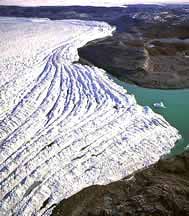Melt down

Thinning on top: the Greenland ice sheet is in retreat. <br>© SPL
Half a century of thinning ice leaves Greenland’s future looking wet.
There is new evidence that the Greenland ice pack is in retreat. The finding may be a foretaste of still more rapid melting, and in turn, rising sea levels.
The ice sheet over northwest Greenland has thinned by 10-15 cm a year over the past 40 years, two scientists calculate1. The trend indicates “a significant long-term thinning”, says one, Niels Reeh, of the Technical University of Denmark.
The sheet is more than 3 km thick in some places. It is the world’s second-largest ice mass after Antarctica. Reeh and Stan Paterson, of Paterson Geophysics in Heriot Bay, British Columbia, Canada, compared historical and modern data. This revealed that thinning has been much more pronounced in northwestern Greenland. In the east, there has been little change.
The reason for the east-west difference is not yet clear. Climate changes that occurred hundreds or even thousands of years ago may have altered the physical properties of the ice sheet. Or, like southern Greenland, the northern sheet may be sliding from east to west. Alternatively, the difference may reflect more recent variations in snowfall and temperatures.
Paterson is convinced that the thinning is due to the Earth’s recent temperature rise: “I’d stick my neck out and say that it’s an effect of global warming.” Taken with signs of shrinking sea ice over the North Pole and melting at Greenland’s coast, “it’s just one more thread in the story”, he says.
“The general consensus is that the central part of the ice sheet is in balance,” cautions climate researcher Ellen Mosley-Thompson, of Ohio State University in Columbus. “But if the thinning is real, and if it were to continue for decades to centuries, that would translate into changes in the ice sheet.”
Others are less sure. “Up to today, there’s been no convincing sign of Greenland growing or shrinking overall,” says Philippe Huybrechts of the Free University of Brussels in Belgium. In fact, Greenland has bucked climate trends, ending the twentieth century slightly cooler than it began, he adds.
Whatever’s happening now, “all climate models show Greenland warming over the coming century”, says Huybrechts. This will cause a rise in sea level of several centimetres. “If the climate were to warm, Greenland will be in bad shape, that’s for sure,” Huybrechts says.
Seeking long-term trends
Several decades of measurements are needed to understand ice sheets. Short-term changes in temperature and snowfall can obscure underlying trends. For the past ten years, satellites and planes have been taking accurate measurements of the ice sheet’s thickness. But there are few good records from before 1990.
The researchers also drew on information gathered by the British North Greenland Expedition of 1954-55. This joint project saw scientists – including Paterson – and the British Navy journey 1,200 km across the top of Greenland, measuring altitude at 300 points along the way.
“The only way in was on RAF flying boats to a lake that was only unfrozen in August,” recalls Paterson, who was also one of four men to cross Greenland. “In those days it was still a bit of an adventure,” he says.
References
- Paterson, A.B. & Reeh, N. Thinning of the ice sheet in northwest Greenland over the past forty years. Nature, 414, 60 – 62, (2001).
Media Contact
All latest news from the category: Earth Sciences
Earth Sciences (also referred to as Geosciences), which deals with basic issues surrounding our planet, plays a vital role in the area of energy and raw materials supply.
Earth Sciences comprises subjects such as geology, geography, geological informatics, paleontology, mineralogy, petrography, crystallography, geophysics, geodesy, glaciology, cartography, photogrammetry, meteorology and seismology, early-warning systems, earthquake research and polar research.
Newest articles

First-of-its-kind study uses remote sensing to monitor plastic debris in rivers and lakes
Remote sensing creates a cost-effective solution to monitoring plastic pollution. A first-of-its-kind study from researchers at the University of Minnesota Twin Cities shows how remote sensing can help monitor and…

Laser-based artificial neuron mimics nerve cell functions at lightning speed
With a processing speed a billion times faster than nature, chip-based laser neuron could help advance AI tasks such as pattern recognition and sequence prediction. Researchers have developed a laser-based…

Optimising the processing of plastic waste
Just one look in the yellow bin reveals a colourful jumble of different types of plastic. However, the purer and more uniform plastic waste is, the easier it is to…



